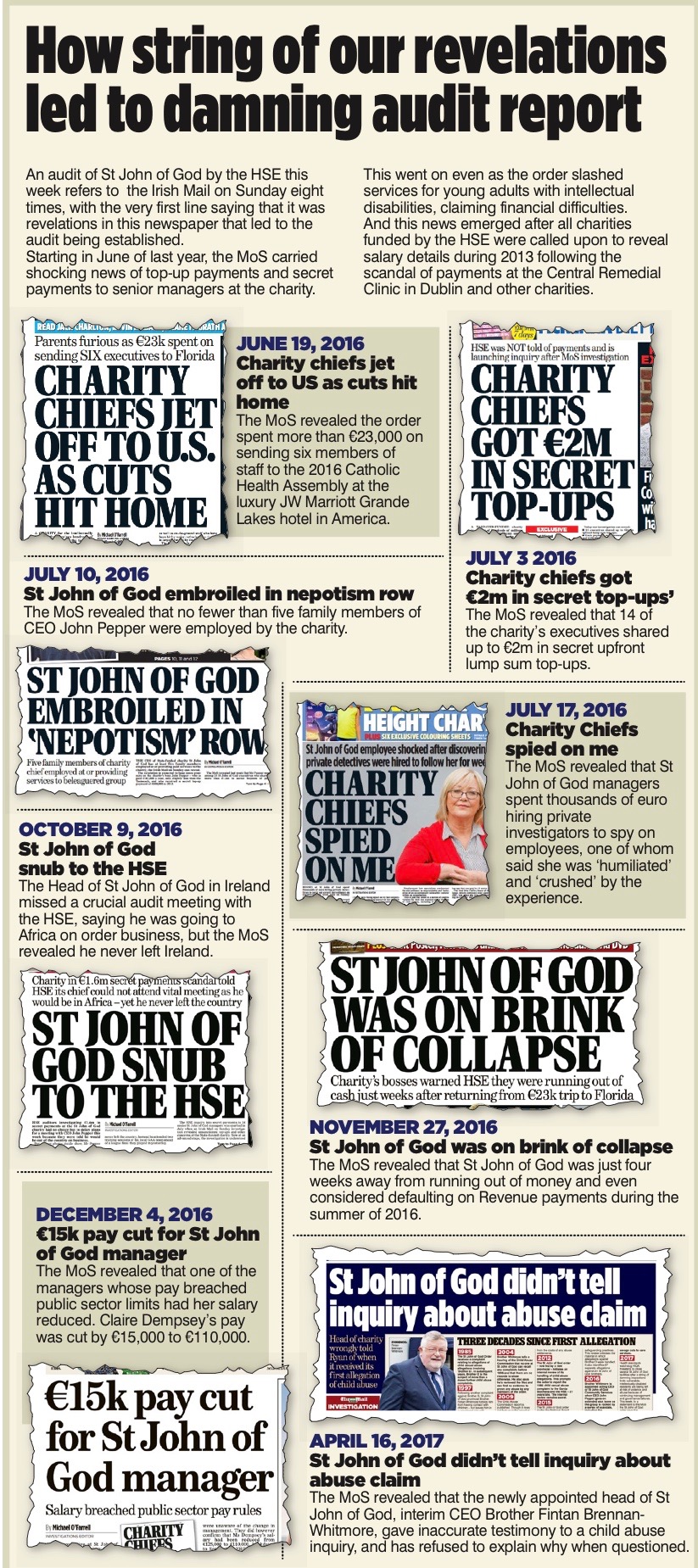INVESTIGATION EXCLUSIVE
By: Michael O’Farrell
Investigations Editor
ST JOHN of God chief John Pepper received more than €2m in secret payments at a time when the charity lied to the HSE and said no such payouts were being made, the Irish Mail on Sunday can reveal.
The astonishing revelation comes in the wake of a damning HSE audit set up as a result of an MOS exposé into clandestine top-ups to 14 executives at the charity, which received more than €500m in taxpayer funds in recent years.
As the MOS revealed, the audit says the payments appear designed to circumvent HSE rules forbidding State-funded health agencies from breaking public-sector pay limits. The practice – which recently resulted in some executives getting as much as €107,000 extra – saw the rules being flouted from as long ago as the 1980s. The audit even states that between 2013 and June last year the charity had many opportunities to disclose its non-compliance, ‘but it did not do so until June 2016 when the compensation payments were exposed by a whistleblower and the Mail on Sunday’.
And when the HSE sought compliance from all charities, instead of stopping the top-ups, St John of God simply made them in secret to executives up to the point of retirement.
This meant 14 managers shared a huge pot of €1.6m in November 2013 alone. Mr Pepper, who went on sick leave after the MoS revelations, received just over €649,000; and finance director Annamarie McGill, regional director Clare Dempsey and procurement director Jane McEvoy were among those who shared in the payout.

Now the audit has found that four favoured executives benefited from a special private pension fund established in 1989.
It said this fund, financed to the tune of millions of euro by the St John of God order, was ‘an additional top-up’.
And the MoS has discovered that Mr Pepper, whose title is chief executive of the St John of God group, was one of those four, and when the fund was wound up in December 2013, he received a once-off benefit of €1,480,000, which he transferred to a retirement fund.
Combined with the secret €649,000 top-up, which was also funded by the St John of God order, this means undeclared payments to him added up to €2,129,000 in 2013, far more than previously thought. Yet throughout this period the charity gave signed compliance statements to the HSE, a requirement in order to ensure continued funding of the €500m in taxpayer funds in recent years.
‘All remuneration… is in accordance with DOH [Department of Health] Consolidated Pay Scales and no non-Exchequer sources of funding are used to supplement employee remuneration,’ a declaration signed by the then CEO reads. The reality is that the charity was not compliant with public pay scales at all. Instead, according to the audit, it was displaying a ‘lack of candour’ that raised fundamental issues of trust.
Such was the extent of this that at, one point in 2013, the charity notified the HSE that a minor allowance of €3,927, paid to an executive, had been discontinued to comply with HSE rules, while not declaring that the same executive was receiving tops-ups worth tens of thousands. Just ten days after this declaration, the executive concerned received a secret, undeclared lump sum of €89,602 as their share of the €1.6m paid to 14 senior managers.
At this time, the charity also submitted a business case to the HSE, in a bid to regularise certain employees who were receiving ‘non-compliant remuneration’.
This stated that it ‘does not pay topups to senior executives. However, in order to ensure we are fully compliant with Health Sector Pay Policy we carried out a root and branch examination of the total remuneration paid to our circa 3,000 employees. Attached are 25 anomalies found as a result of this analysis.’ The audit found that ‘none of the 25 cases included any of the 14 senior managers who were at that time in receipt of secret top-ups. It also found undeclared top-ups were paid at St John of God from 1986.
In the months after the MOS exposé, the group told the HSE that it had identified in excess of 80 further cases in which allowances and salaries were not in compliance with pay rules. None of these involved the 14 who shared previous pay-outs.
The audit also confirms that the charity’s auditors, PWC, oversaw and calculated the secret payouts to the 14 executives, which were agreed in a specially-convened, 20-minute board meeting of the order, days before the payments were made.
The payouts were never identified in a transparent manner in the audited annual accounts filed publicly.
In a move which the audit described as ‘difficult to comprehend’, there were ‘no terms and conditions and no signed agreements associated with any of the compensation payments’.
There were also no clawback provisions, meaning any executive who left before retirement, which happened in several cases, had been paid in advance for unauthorised benefits up to the point of retirement.
St John of God has said it was necessary to make the payments to 12 of the 14 managers to buy out potential future pension liabilities that might arise, an argument the HSE audit report completely rejects.
In a statement, St John of God also said: ‘We do not believe that we have deliberately misled the HSE at any point.’ The audit has also expressed concern that an unknown number of employees working for private St John of God firms could have become enlisted in the HSE’s public sector pension, something that creates an unknown risk to the taxpayer.





test